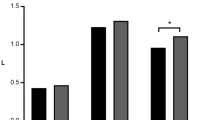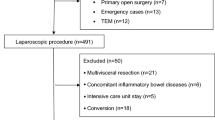Abstract
Purpose
An enhanced recovery after surgery (ERAS) protocol for colorectal cancer resection encourages perioperative euvolemic status, and zero-balance fluid therapy is recommended for low-risk patients. Recently, several studies have reported concerns of increased acute kidney injury (AKI) in patients within an ERAS protocol. In the present study, we investigated the impact of intraoperative zero-balance fluid therapy within an ERAS protocol on postoperative AKI.
Methods
Patients who underwent elective surgery for primary colorectal cancer were divided into zero-balance and non-zero-balance fluid therapy groups according to intraoperative fluid amount and balance. After propensity score (PS) matching, 210 patients from each group were selected. Incidences of AKI were compared between the two groups according to the Kidney Disease Improving Global Outcomes criteria. Postoperative kidney functions and surgical outcomes were also compared.
Results
AKI was significantly higher in the zero-balance fluid therapy group compared to the non-zero-balance fluid therapy group (21.4% vs. 13.8%, p = 0.040) in PS-matched patients. The decrease in the estimated glomerular filtration rate on the day of surgery was significantly higher in the zero-balance fluid therapy group (− 5.9 mL/min/1.73 m2 vs. − 1.4 mL/min/1.73 m2, p = 0.005). There were no differences in general morbidity or mortality rate, although surgery-related complications were more common in the zero-balance group.
Conclusions
Despite the proven benefits of zero-balance fluid therapy in colorectal ERAS protocols, care should be taken to monitor for postoperative AKI. Further studies regarding the clinical significance of postoperative AKI occurrence and optimised intraoperative fluid therapy are needed in a colorectal ERAS setting.



Similar content being viewed by others
Data availability
The study data is not available. Code availability the code is not available.
References
Greco M, Capretti G, Beretta L, Gemma M, Pecorelli N, Braga M (2014) Enhanced recovery program in colorectal surgery: a meta-analysis of randomized controlled trials. World J Surg 38(6):1531–1541. https://doi.org/10.1007/s00268-013-2416-8
Asklid D, Segelman J, Gedda C, Hjern F, Pekkari K, Gustafsson UO (2017) The impact of perioperative fluid therapy on short-term outcomes and 5-year survival among patients undergoing colorectal cancer surgery - a prospective cohort study within an ERAS protocol. Eur J Surg Oncol 43(8):1433–1439. https://doi.org/10.1016/j.ejso.2017.04.003
Gustafsson UO, Scott MJ, Hubner M, Nygren J, Demartines N, Francis N, Rockall TA, Young-Fadok TM, Hill AG, Soop M, de Boer HD, Urman RD, Chang GJ, Fichera A, Kessler H, Grass F, Whang EE, Fawcett WJ, Carli F, Lobo DN, Rollins KE, Balfour A, Baldini G, Riedel B, Ljungqvist O (2019) Guidelines for perioperative care in elective colorectal surgery: Enhanced Recovery After Surgery (ERAS®) Society recommendations: 2018. World J Surg 43(3):659–695. https://doi.org/10.1007/s00268-018-4844-y
Thacker JKM, Mountford WK, Ernst FR, Krukas MR, Mythen MG (2016) Perioperative fluid utilization variability and association with outcomes: considerations for enhanced recovery efforts in sample US surgical populations. Ann Surg 263(3):502–510. https://doi.org/10.1097/sla.0000000000001402
Carmichael JC, Keller DS, Baldini G, Bordeianou L, Weiss E, Lee L, Boutros M, McClane J, Feldman LS, Steele SR (2017) Clinical practice guidelines for enhanced recovery after colon and rectal surgery from the American Society of Colon and Rectal Surgeons and Society of American Gastrointestinal and Endoscopic Surgeons. Dis Colon Rectum 60(8):761–784. https://doi.org/10.1097/DCR.0000000000000883
Feldheiser A, Aziz O, Baldini G, Cox BP, Fearon KC, Feldman LS, Gan TJ, Kennedy RH, Ljungqvist O, Lobo DN, Miller T, Radtke FF, Ruiz Garces T, Schricker T, Scott MJ, Thacker JK, Ytrebo LM, Carli F (2016) Enhanced Recovery After Surgery (ERAS) for gastrointestinal surgery, part 2: consensus statement for anaesthesia practice. Acta Anaesthesiol Scand 60(3):289–334. https://doi.org/10.1111/aas.12651
Myles PS, Bellomo R, Corcoran T, Forbes A, Peyton P, Story D, Christophi C, Leslie K, McGuinness S, Parke R, Serpell J, MTV C, Painter T, Mc Cluskey S, Minto G, Wallace S, Australian, New Zealand College of Anaesthetists Clinical Trials N, the A, New Zealand Intensive Care Society Clinical Trials G (2018) Restrictive versus liberal fluid therapy for major abdominal surgery. N Engl J Med 378(24):2263–2274. https://doi.org/10.1056/NEJMoa1801601
Masoomi H, Carmichael JC, Dolich M, Mills S, Ketana N, Pigazzi A, Stamos MJ (2012) Predictive factors of acute renal failure in colon and rectal surgery. Am Surg 78(10):1019–1023
Slagelse C, Gammelager H, Iversen LH, Sorensen HT, Christiansen CF (2019) Acute kidney injury and 1-year mortality after colorectal cancer surgery: a population-based cohort study. BMJ Open 9(3):e024817. https://doi.org/10.1136/bmjopen-2018-024817
Koerner CP, Lopez-Aguiar AG, Zaidi M, Speegle S, Balch G, Shaffer VO, Staley CA, Srinivasan J, Maithel SK, Sullivan PS (2019) Caution: increased acute kidney injury in Enhanced Recovery After Surgery (ERAS) protocols. Am Surg 85(2):156–161
Marcotte JH, Patel K, Desai R, Gaughan JP, Rattigan D, Cahill KW, Irons RF, Dy J, Dobrowolski M, McElhenney H, Kwiatt M, McClane S (2018) Acute kidney injury following implementation of an enhanced recovery after surgery (ERAS) protocol in colorectal surgery. Int J Color Dis 33(9):1259–1267. https://doi.org/10.1007/s00384-018-3084-9
Sear JW Kidney dysfunction in the postoperative period. (0007–0912 (Print))
Kellum JA, Lameire N, for the KAKIGWG (2013) Diagnosis, evaluation, and management of acute kidney injury: a KDIGO summary (part 1). Crit Care 17(1):204. https://doi.org/10.1186/cc11454
Fearon KCH, Ljungqvist O, Von Meyenfeldt M, Revhaug A, Dejong CHC, Lassen K, Nygren J, Hausel J, Soop M, Andersen J, Kehlet H (2005) Enhanced recovery after surgery: a consensus review of clinical care for patients undergoing colonic resection. Clin Nutr 24(3):466–477. https://doi.org/10.1016/j.clnu.2005.02.002
Gustafsson UO, Scott MJ, Schwenk W, Demartines N, Roulin D, Francis N, McNaught CE, MacFie J, Liberman AS, Soop M, Hill A, Kennedy RH, Lobo DN, Fearon K, Ljungqvist O (2012) Guidelines for perioperative care in elective colonic surgery: Enhanced Recovery After Surgery (ERAS®) Society recommendations. Clin Nutr 31(6):783–800. https://doi.org/10.1016/j.clnu.2012.08.013
Nygren J, Thacker J Fau-Carli F, Fearon, KCH, Fau-Norderval S, Lobo DN, Ljungqvist O, Soop M, Ramirez J Guidelines for perioperative care in elective rectal/pelvic surgery: Enhanced Recovery After Surgery (ERAS®) Society recommendations. (1532–1983 (Electronic))
Kim MK, Kim JG, Lee G, Won DD, Lee YS, Kye BH, Kim J, Lee IK (2019) Comparison of the effects of an ERAS program and a single-port laparoscopic surgery on postoperative outcomes of colon cancer patients. Sci Rep 9(1):11998. https://doi.org/10.1038/s41598-019-48526-1
Gupta R, Gan TJ (2016) Peri-operative fluid management to enhance recovery. Anaesthesia 71(Suppl 1):40–45. https://doi.org/10.1111/anae.13309
Chappell D, Jacob M, Hofmann-Kiefer K, Conzen P, Rehm M (2008) A rational approach to perioperative fluid management. Anesthesiology 109(4):723–740. https://doi.org/10.1097/ALN.0b013e3181863117
Mythen MG, Swart M, Acheson N, Crawford R, Jones K, Kuper M, McGrath JS, Horgan A (2012) Perioperative fluid management: consensus statement from the enhanced recovery partnership. Perioper Med (Lond) 1:2. https://doi.org/10.1186/2047-0525-1-2
Go J, Park SC, Yun SS, Ku J, Park J, Shim JW, Lee HM, Kim YS, Moon YE, Hong SH, Chae MS (2019) Exposure to hyperchloremia is associated with poor early recovery of kidney graft function after living-donor kidney transplantation: a propensity score-matching analysis. J Clin Med 8(7). https://doi.org/10.3390/jcm8070955
Orbegozo Cortes D, Gamarano Barros T, Njimi H, Vincent JL (2015) Crystalloids versus colloids: exploring differences in fluid requirements by systematic review and meta-regression. Anesth Analg 120(2):389–402. https://doi.org/10.1213/ANE.0000000000000564
Khwaja A (2012) KDIGO clinical practice guidelines for acute kidney injury. Nephron Clin Pract 120(4):c179–c184. https://doi.org/10.1159/000339789
Levey AS, Coresh J, Greene T, Stevens LA, Zhang YL, Hendriksen S, Kusek JW, Van Lente F (2006) Using standardized serum creatinine values in the modification of diet in renal disease study equation for estimating glomerular filtration rate. Ann Intern Med 145(4):247–254. https://doi.org/10.7326/0003-4819-145-4-200608150-00004
Grass F, Lovely JK, Crippa J, Mathis KL, Hubner M, Larson DW (2019) Early acute kidney injury within an established enhanced recovery pathway: uncommon and transitory. World J Surg 43(5):1207–1215. https://doi.org/10.1007/s00268-019-04923-1
Horres CR, Adam MA, Sun Z, Thacker JK, Moon RE, Miller TE, Grant SA (2017) Enhanced recovery protocols for colorectal surgery and postoperative renal function: a retrospective review. Perioper Med (Lond) 6:13. https://doi.org/10.1186/s13741-017-0069-0
Liu Z, Yang M, Zhao Z-X, Guan X, Jiang Z, Chen H-P, Wang S, Quan J-C, Yang R-k, Wang X-s (2018) Current practice patterns of preoperative bowel preparation in colorectal surgery: a nation-wide survey by the Chinese Society of Colorectal Cancer. World J Surg Oncol 16(1):134. https://doi.org/10.1186/s12957-018-1440-4
Green BL, Marshall HC, Collinson F, Quirke P, Guillou P, Jayne DG, Brown JM (2013) Long-term follow-up of the Medical Research Council CLASICC trial of conventional versus laparoscopically assisted resection in colorectal cancer. Br J Surg 100(1):75–82. https://doi.org/10.1002/bjs.8945
Lacy AM, Delgado S, Castells A, Prins HA, Arroyo V, Ibarzabal A, Pique JM (2008) The long-term results of a randomized clinical trial of laparoscopy-assisted versus open surgery for colon cancer. Ann Surg 248(1):1–7. https://doi.org/10.1097/SLA.0b013e31816a9d65
Guillou PJ, Quirke P, Thorpe H, Walker J, Jayne DG, Smith AMH, Heath RM, Brown JM (2005) Short-term endpoints of conventional versus laparoscopic-assisted surgery in patients with colorectal cancer (MRC CLASICC trial): multicentre, randomised controlled trial. Lancet 365(9472):1718–1726. https://doi.org/10.1016/s0140-6736(05)66545-2
Bonjer HJ, Deijen CL, Abis GA, Cuesta MA, van der Pas MHGM, de Lange-de Klerk ESM, Lacy AM, Bemelman WA, Andersson J, Angenete E, Rosenberg J, Fuerst A, Haglind E (2015) A randomized trial of laparoscopic versus open surgery for rectal cancer. N Engl J Med 372(14):1324–1332. https://doi.org/10.1056/NEJMoa1414882
Voldby AW, Brandstrup B (2016) Fluid therapy in the perioperative setting-a clinical review. J Intensive Care 4:27. https://doi.org/10.1186/s40560-016-0154-3
Longo WE, Virgo KS, Johnson FE, Oprian CA, Vernava AM, Wade TP, Phelan MA, Henderson WG, Daley J, Khuri SF (2000) Risk factors for morbidity and mortality after colectomy for colon cancer. Dis Colon Rectum 43(1):83–91. https://doi.org/10.1007/bf02237249
Thakar CV, Yared JP, Worley S, Cotman K, Paganini EP (2003) Renal dysfunction and serious infections after open-heart surgery. Kidney Int 64(1):239–246. https://doi.org/10.1046/j.1523-1755.2003.00040.x
Lafrance J-P, Miller DR (2010) Acute kidney injury associates with increased long-term mortality. J Am Soc Nephrol 21(2):345–352. https://doi.org/10.1681/ASN.2009060636
Bihorac A, Brennan M, Ozrazgat-Baslanti T, Bozorgmehri S, Efron PA, Moore FA, Segal MS, Hobson CE (2013) National surgical quality improvement program underestimates the risk associated with mild and moderate postoperative acute kidney injury. Crit Care Med 41(11):2570–2583. https://doi.org/10.1097/CCM.0b013e31829860fc
Funding
The authors received the financial support of the Catholic Medical Center Research Foundation made in the program year of 2019.
Author information
Authors and Affiliations
Contributions
Conceptualisation, J.S. and S.H.H.; data curation, J.S., J.K., K.R., and H.R.; formal analysis, J.S., J.K., K.R., H.R., C.S.L., S.R.H., Y.S.L., I.K.L., J.P., H.M.L., M.S.C., H.L., and S.H.H.; funding acquisition, S.H.H.; investigation, J.S., J.K., K.R., H.R., C.S.L., S.R.H., Y.S.L., I.K.L., J.P., H.M.L., M.S.C., H.L., and S.H.H.; methodology, J.S. and S.H.H.; resources, J.S.; software, J.S.; supervision, J.S. and S.H.H.; validation, J.S. and S.H.H.; visualisation, J.S.; writing—original draft, J.S.; writing—review and editing, J.S. and S.H.H.
Corresponding author
Ethics declarations
Conflict of interest
The authors declare that they have no conflicts of interest.
Ethics approval
All procedures performed in this study were in accordance with the ethical standards of the Institutional Review Board at the College of Medicine. This study was approved by the Institutional Review Board and Ethics Committee of Seoul St. Mary’s Hospital (approval number: KC19RESI0598).
Consent to participate
Informed consent from patients to be included in this study was waived according to the policy of our IRB.
Consent for publication
Informed consent from patients to be included in this study was waived according to the policy of our IRB.
Additional information
Publisher’s note
Springer Nature remains neutral with regard to jurisdictional claims in published maps and institutional affiliations.
Electronic supplementary material
ESM 1
(DOCX 17 kb)
Rights and permissions
About this article
Cite this article
Shim, JW., Kwak, J., Roh, K. et al. Impact of intraoperative zero-balance fluid therapy on the occurrence of acute kidney injury in patients who had undergone colorectal cancer resection within an enhanced recovery after surgery protocol: a propensity score matching analysis. Int J Colorectal Dis 35, 1537–1548 (2020). https://doi.org/10.1007/s00384-020-03616-9
Accepted:
Published:
Issue Date:
DOI: https://doi.org/10.1007/s00384-020-03616-9




